#these the same kinda people who use the ‘what if black panther was white’ argument
Photo
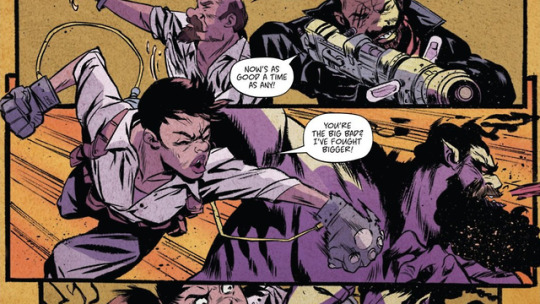
I read the extremely-celebrated first volume of Bitter Root.
It’s successful by the standards of current comics. The current standard: just have a really, really great high concept that resonates on both a simplistic genre level and that has some ultra-basic political moralizing that you can’t really “disagree” with, without exposing yourself as being retrograde, and thus easily dismissed; executing on that high concept is *completely optional.* That’s Maneaters, that’s Bitch Planet, that’s Bitter Root, anyways.
The high concept: during the Harlem Renaissance, a black family of monster-fighters takes on the worst monsters there are -- WHITE DEVILS. White people who do racism magically transform into devils that the black characters punch or shoot or some shit.
That’s a successful concept under the current rules of engagement. And that’s all you need; again, execution is optional. Whee! Maneaters had no noticeable craft to it whatsoever-- the execution was embarrassing, plus, boy, the creators sure seemed to mistreated their readers, that ugly business with the tweets. Bitch Planet, my memory’s not great, it’s been a while, but I just remember there being an unusual amount of football or soccer or something in there...? An unexpected quanta of foozball.
Bitter Root, past the premise, it’s just sort of a 90′s Cliffhanger comic (e.g. Dangers Girls or Battle Chasers), though without a Cliffhanger comic’s open horniness. It’s trying to do a shonen thing-- the characters face a bad guy, but don’t get around to defeating the bad guy but oh no there’s a worse bad guy on the horizon. The bulk of the 123 pages is just a single chaotic monster fight that just goes on and on and on and on, and all takes place in a single night. Didn’t feel like they had to move that story forward too fast, I guess! Just wanted to take their time... I don’t know-- I just get bored when I can tell a comic’s not going to get around to attempting to tell a story anytime soon, but I guess I’m out-of-touch that way.
(TV tried to pace things like that for a minute, and then a bunch of them figured out like “if we do that, people will stop watching.” Comics as a whole just dug their heels in on slow pacing and simultaneously jacked up the prices, which ... you have to admire the stubbornness at least!).
I mean, there’s nothing wrong with 90′s Cliffhanger or with shonen. But the reviews for this are so orgiastic-- like the book has one guy who’s like more of a Wolverine/Blade type character (but who really doesn’t do anything that cool past issue #1 or 2!), or as one review put it: “It's a deliberate callback to the debates of civil disobedience versus militarism during the Civil Rights movement... or the more recent debates between discourse and more harsh responses in today's fights against white nationalism. Bitter Root is a fun book, Bitter Root is a smart book, and most importantly Bitter Root is a necessary book for today's world.” *A necessary book for today’s world!* It’s a fight comic about monsters...!
Plus, the trade comes with like 7 essays about how the publication of Bitter Root is the most important thing to happen to all black people since Nino Brown got shot down. It’s not that the comic’s bad exactly (except for one character who they just give thesaurus words to-- comic people love to do that and it always sucks)(Frank Miller did that in a Sin City; I’d hazard to guess 90% of crime comics have had a “guy who owns a dictionary” character at some point-- it’s like the Opposite of Wally Wood’s 22 panels that always work). But it’s mostly not bad. It’s just... Seems pretty inessential. Good drawings-- fun art to look at. Interesting coloring though sometimes some pretty curious choices with the lighting (like what’s going on in this panel with the girl’s face???). A couple cool lines of dialogue here and there, though an awful lot of the dialogue involves some character or another saying “I’ve seen this before! I’ve seen this before and yet do not feel compelled to tell you when or where or what we did about it!” Plus, some storytelling choices I wondered about-- like, I think one issue ends on a cliffhanger of a character getting sucked into hell, but rather than let that have any dramatic weight, they show you that character’s fine on the NEXT page (fatally undercutting that character’s later “resurrection” having any zazzle to it whatsoever...).
None of the characters really make an impression beyond their half-sentence "logline.” It’s an Image comic, so you know: the joke we all make is those are all TV / Movie pitches. So the girl character being “a girl who wants to fight even though society is like don’t fight you’re a girl” and not being anything even one iota more than that... You can kinda look at that and go, “well they didn’t need more than that for a pitch.” I picked out this panel of art (above) because of that line about “the big bad” which is like a 90′s Joss Whedon show term. They’re having their characters in a Harlem period piece use Joss Whedon Writer’s Room lingo!!!! That sort of nerd shorthand spoke immediately to me about what kind of comic this was, who it was meant for, the limits of its ambitions...
And you know, maybe that’s unfair because this feels really influenced by manga and manga has certainly a particular rhythm that while it resembles television, isn’t... doesn’t feel inorganically arrived at(?); it feels true to the creators. But. I guess what’s in my head is: with manga, the characters are the content. With Cliffhanger comics, the art was the content. When Cliffhanger was coming out, there was also Vertigo at its peak-- there, the story/aesthetics were the content. Here, with these Image books, I just always end up sitting here feeling like the concept is the content, which is ... there’s no motivation to keep reading when that’s the case! But I’m not you know... I’m not a very giving or generous reader, either, so. I know that about myself at this point so...
(Tangent: Larry Fishburne was doing a podcast that was set around this same era, but in Chicago that... At least had Larry Fishburne’s voice in it... but no monsters-- I mean, it’s an interesting era if you think about... like that argument Killer Mike makes about black businesses and the black dollar pre-desegregation, an economic environment which Fishburne’s podcast I think touched on more, whereas this comic doesn’t really... doesn’t really dig into Harlem or the period at all, as it’s too busy being exclusively about a 100+ page single fight with some monsters...)
As for the thematic content that gets people so inspired-- ehhh. I don’t know. I mean, think on Milestone for a second. To me what made Milestone so remarkable when it was coming out-- the thing that always struck me-- a lot of those books weren’t awesome to look at or read sometimes; I never dug the colors; but... In my memory of them, at least (perhaps rose-colored?), they actually embraced diversity in a really dedicated way. Milestone I think recognized the diversity that existed within races themselves, so you’d have ... black superheros who were conservative Republicans, while other black superheros were scrappy nerdy kids, while the black characters who were in a street gang had their own worldviews that were diametrically opposed to the other two, or. I mean, they didn’t just focus on the black experience-- they had Xombi in there which I really loved; Hispanic characters; et cetera. Or they’d do a miniseries but it’d be about Holocaust, the bad guy in the evil black gangs.
Part of what Milestone tried to explode was the idea that only some model minority got to be a superhero or was uniquely part of the American experience moreso than any other minority. Whereas this Bitter Root is instead about like ... This one special family where everyone is more awesome than the rest of the community... So, yeah: ehhhh. By comparison that feels significantly less-than.
Or for me, this felt like it was speaking to the sort of modern internet-fave notion that only white people can be racist. That horseshit about “only white people can be racist because of the power differential” or whatever...? I think that whole argument is just pretty dopey, personally. I don’t get down with that talk anyways, though it has its utility and places where it’s appropriate. (I mean, the argument at least suggests that its audience consider power structures and institutionalized racism, I suppose, but).
But I found Bitter Root’s project to be one that was ... celebratory; meant to “give black audiences the fantasy genre experience they’ve been waiting for.” Which I guess is powerful for people-- that reaction to Black Panther suggests that, say. I've just had a hard time understanding that as an end goal. For me, being Indian-American, I was more struck by something like Master of None, when that came out, the experience of ... recognizing its world, of being able to finally feel that the world it was set in and talking about was finally closer to the world I lived in. As opposed to it handing me some power fantasy for lame Indian boys (besides the fantasy of being good at making pasta which... actually that part got to me a lot but)... I don’t remember being young enough to remember if an “Indian-American-specific power fantasy” was a desire I ever had; I remember wanting to be whichever X-Men got to do sex with Kitty Pryde, not an Indian-American X-Men, you know? But even if I did want a more racially-specific power fantasy back then, I’m glad that desire wasn’t one that was indulged! I mean, when has giving kids power fantasies ever worked out okay for them? People who like power fantasies too much seem all fucked up by those things, except for when I watch low-grade Japanese porno, then thumbs up. Like, we’re supposed to believe if we give little minority children power fantasies they’ll all end up in NASA, but my experience tells me they’ll just end up shouting at minority girls for “trying to steal X-Shaft away from them” or whatever the hell...
Anyways, it’s a good looking comic, though, and it’s not un-entertaining. It deserves some level of praise. And if it got more than that, heck, great. What’s the harm, I guess? People were all excited today about a $6 X-Men comic. (Or $6 on Comixology at least). So I mean, what’s the harm if Bitter Root gets talked up, I guess...? It’s fine. I mean, I guess it’s fine. Fine. I don’t know. There was a nice page where two characters talk while a different set of characters talk in caption boxes, while a bird flies around between the two sets of conversations. I liked that page, I guess. I don’t think this one’s just my kind of thing though... I was into some of the drawings, but just... It just went on a bit without really just moving shit forward, I think was just the part that rankled more than anything...
Sorry to ramble on and on. Strange few weeks at work-- been needing to blow off steam I guess...
10 notes
·
View notes
Text
The Falcon and the Winter Soldier Episode 6 Marvel, Captain America, MCU Easter Eggs
https://ift.tt/eA8V8J
This article contains The Falcon and the Winter Soldier Episode 6 spoilers and potential spoilers for the wider MCU.
Well, it’s finally here. The Falcon and the Winter Soldier episode 6 was an action-packed, but rather messy season finale for the show. Hopefully it isn’t a series finale, and we’ll see it continue in season 2 as Captain America and the Winter Soldier, but that’s an argument for another time.
For now, we’re here (as usual) to dig in to all the Marvel Comics and MCU references the show gave us this episode. We’ll be honest, it was relatively light on those, but there’s still plenty to speculate about. And if you spot anything we missed, be sure to let us know in the comments!
The New Captain America
Sam’s incredibly sharp-looking Captain America costume is a perfect live action translation of the version he wore in the comics. That costume was designed by Carlos Pacheco, and first hit the pages of Marvel Comics in October of 2014, in All-New Captain America #1. Even then, it felt like a perfectly movie-ready design, but to see it translated to beautifully to live action is a real treat, and this is an immediate contender for “best superhero movie or TV suit” right now. The additional stars and stripes motif added to the underside of the wings here seems to be an MCU flourish, but that’s just one little way they managed to improve on perfection.
It’s safe to assume that Sam’s new wings are vibranium, or at least vibranium laced, just like his shield, considering that it was made for him by the tech geniuses in Black Panther‘s Wakanda. There’s something to be said here about how America is stronger when it works with and accepts help from its allies, as opposed to going it alone. Just witness how much better Sam’s wings hold up under pressure than Walker’s homemade shield.
Similarly, Sam primarily uses the shield and the wings for defense. Compare that to how Walker wields his shield, as a slashing/bludgeoning weapon for offense. It’s a nice illustration of two different interpretations about how best to utilize America’s power.
Bucky
Bucky’s leap from a barrier-crashing motorcycle in episode 6 is a nice callback to Steve’s very similar move in Captain America: The Winter Soldier. As a voice barked “stand down” from a SHIELD quinjet, Steve hit a barrier on his bike and was thrown forward into the action.
We also see Bucky straining to open the back of the van with his vibranium arm, but he doesn’t flex as hard as Steve did when he stopped Bucky taking off in a helicopter in that same movie. Both Sam and Bucky reflect elements of what made Steve an exceptional Captain America in the finale, and prove to be a terrific team.
Bucky gives Steve’s notebook to his therapist as a thank you gift. Honestly, she deserves less. It belongs in a museum.
U.S. Agent
John Walker manages to control the effects that the super soldier serum is having on his psyche when he gets a second chance to prove himself, dropping his damaged makeshift shield and realizing he needs to prioritize human lives over vengeance.
Val says that people will need a “US Agent” soon, and not a Captain America, as things are about to get “weird”. US Agent, of course, was the codename Walker took on after he stopped being Captain America in the comics. Speaking of which, Walker’s new costume is basically identical to his Marvel Comics US Agent costume and it looks really great here. We wrote more about the Marvel Comics history of U.S. Agent here.
Why are Val, Walker and his wife back in the courthouse where Walker got court martialed to try on his new US Agent costume? Feels like pandemic-related restrictions forced the show to film all those scenes at the same time, doesn’t it?
Isaiah Bradley
Sam returning to properly make sure Isaiah Bradley gets his due once again mirrors the excellent Truth: Red, White, and Black story by Robert Morales and Kyle Baker. There it was Steve who made sure that Isaiah’s deeds were finally known to the world.
Hopefully this isn’t the last we see of Isaiah, but you can bet we’re going to get more of Elijah down the road. Between introducing two members of the Young Avengers in WandaVision with Billy and Tommy, and the impending arrival of Kate Bishop on Hawkeye later this year, young Elijah is due to get himself some red, white, and blue duds of his own.
Sharon Carter is the Power Broker?
Yes, Sharon Carter is the Power Broker. No, it doesn’t make a whole lot of sense. She took Sam, Bucky, and Zemo to see super soldier serum scientist Dr. Nagel in his lab. He was working for her! She let that dangerous shit play out, which was very much against her interests! What! No. What! The man must have been confused as hell in his final moments.
Sharon uses the same tech that Natasha Romanoff used to disguise her face during the climax of Captain America: The Winter Soldier.
We find out that Sharon was indeed behind Karli’s initial rise to Flag-Smasher power, after taking her in and giving her a chance in Madripoor. Sharon is willing to forgive the betrayal if Karli and her friends come back to the fold, but Karli’s too far gone for that.
Sharon gets a pardon from the US government. I guess it wasn’t that hard after all. Maybe you could click this link while you’re here.
Is this the first time Sharon has been called Agent Carter in the MCU? And is there some way to bring Peggy back to kick her narrow Power Brokering ass? How dare you besmirch the Carter name, girl.
Sharon’s “mercury vapor” bomb that takes out that poor dude kind of feels like the dust that the Red Skull used to use during the Mark Gruenwald era of the comics to kill people…which left them looking like red skulls. Uh-oh…this brings us to the next question…
Who was Sharon calling at the end? Val? Nick Fury? Her Skrull bosses? Alexander Lukin? Something is definitely wrong here. It’s possible that she’s working with Val to put together a team of Dark Avengers/Thunderbolts, but nothing makes a lot of sense with Sharon’s arc in the MCU in general, let alone this show.
Zemo
That is indeed Zemo’s butler Oeznik (played by Nicholas Pryor) who kills the fuck out of the Flag-Smashers in the police van with a remote controlled incendiary device. What an Evil Jarvis. In any case, Zemo got at least some of his wish, as now there are a few fewer super soldiers running around the MCU.
Among the books that Zemo is reading in his cell is Alexander von Humboldt’s Views of Nature – the German polymath, geographer, naturalist and explorer was the first person to truly make note of human-induced climate change. But we can only assume that the book Zemo is holding close to his heart as he hears the fate of the Flag-Smashers is the Machiavelli tome that Bucky rudely interrupted earlier in the series.
Despite the news saying that there are no suspects in the Flag-Smasher bombing, Val knows straight away that it was Zemo who had “the last laugh”. Huh. “Couldn’t have worked better if I planned it myself,” she jokes. “Oh, well, maybe I did. No, I’m kidding, I didn’t. Or did I?” Who the hell knows, Val.
Batroc
Is Batroc dead? Batroc had better not be dead! We demand more Georges St-Pierre in the MCU! Ze Leaper has managed to escape certain death multiple times in the MCU so far, and we’d like that trend to continue. He’s such a great all-purpose, kinda hapless baddie, that we’d love to just see him show up for the occasional slugfest. Or hell, maybe a Batroc fight can be a kind of “right of passage” for anyone else who has to wear the Captain America costume down the road!
And hey, he even did some leaping in this episode!
The Flag-Smashers
Sam’s face-off with Karli Morgenthau is a lot like Steve’s final face-off with Bucky in Captain America: The Winter Soldier when he tries to talk her down instead of fighting back.
The Raft
The Raft was first introduced to the MCU in Captain America: Civil War, but the fact that they’re going out of their way to mention it multiple times in this show, and the fact that the Flag-Smashers were destined for there (after all, they’re super soldiers) should be an indication of just how important that place is going to be to the MCU going forward. I think we can safely expect both Val and Sharon to be doing some recruiting out of there.
The New Falcon?
We only get a brief moment with Danny Ramirez’s Joaquin Torres, as he gazes adoringly at the TV broadcast with Sam as Captain America, but hopefully we get more of him in the future. After all, Joaquin became the new Falcon when Sam wore the red, white, and blue in the comics, and he DOES have Sam’s old wings.
Where is Steve Rogers?
You know, if they keep making that joke about Steve being “on the moon” maybe there’s gonna turn out to be some truth to it. Is this how the MCU will introduce the “man on the wall” concept from the Original Sin story in Marvel Comics? OK, fine, probably not.
The Bridge
Sam having his first big public moment on a bridge between Manhattan and Brooklyn, where New Yorkers see him, cheer him, and implicitly accept him as a hero feels like moments in Sam Raimi’s first two Spider-Man movies, particularly the Brooklyn Bridge scene in the first one, and the subway car scene in Spider-Man 2. This is decidedly less heavy-handed, though.
Ayla
GRC representative Ayla is not from Marvel Comics. We don’t get her last name, and she shares a first name with extremely obscure Nightstalkers villain Rotwrap. Look, there’s not a lot going on in this episode, we’re trying.
Speaking of things we don’t have a lot on…
“Government Official”
Can you believe that despite appearing in nearly every episode of this show, Alphie Hyorth’s bearded senator is still only named as “government official” in the credits? What are you hiding Marvel?!? Maybe he’s actually Mephisto! (sorry, a little WandaVision humor there)
cnx.cmd.push(function() { cnx({ playerId: "106e33c0-3911-473c-b599-b1426db57530", }).render("0270c398a82f44f49c23c16122516796"); });
But for real, why would you have a recurring character who ends up central to so many elements of this story and NOT name him? Is he a Skrull? Is he Senator Robert Kelly? (look, we miss all the mutant speculation from the WandaVision days)
Spot anything we missed? Let us know in the comments!
The post The Falcon and the Winter Soldier Episode 6 Marvel, Captain America, MCU Easter Eggs appeared first on Den of Geek.
from Den of Geek https://ift.tt/3tL3EAE
0 notes
Text
Guess who has seen Black Panther? And let me tell you can believe the hype, because it was a fantastic movie.
Spoilerfree Review: (aka all the things I loved)
- All the women. Because there were a lot of them, basically T’Challa’s entire entourage was female. They were his mentors, his family, his protectors. They were a vital part of the action. Without them the movie wouldn’t have worked. And T’Challa is acknowleding their help all the time.
- Wakanda. The mix between traditional Afrika and the high developed engineering we see. The symbolic meaning and what the country represents.
- The costumes. For them alone this movie is worth watching.
- The soundtrack. Again great between traditional and modern.
- Martin Freeman as the token white guy.
- The action scenes. There is a car chase sequence that looks amazing.
- The big moral and political questions this movie is build around. I don’t want to go too much into details here, but to me that was the strongest point of the movie. Simply the tone of the movie reminded me of the last two Captain America movies, Winter Soldier & Civil War, who were at their core political movies as well.
- The villian. Because even though there are a few exceptions most Marvel villians are kinda... meh. Kilmonger though was great. There was a moment where I wondered if the villian actually has a point, which to me proves what a good movie Black Panther is, because it questions the hero and isn’t afraid to ask questions that are complicated and whose answers you might don’t like.
I tried very hard to find something about this movie that I didn’t like, but there is nothing. It is funny, it has action, great characters, but most of all it might be one of the most relevant movies in 2018, that feels like both a commentary and an answer to our current political clima. If you have not seen it, please take the time. (And yes, you can totally watch it without ever seeing any other Marvel movie before.)
STUFF I ALSO WANNA TALK ABOUT THAT IS FULL OF SPOILERS, SO I TAKE IT UNDER THE CUT, PLEASE DON’T READ IF YOU HAVE NOT SEEN THE MOVIE YET.
Something the movie doesn’t directly talk about, but that is a constant theme in the subtext is racism, white privilege, cononialism and the opression of black people. And they do an interesting twist in the way that all the people of Wakanda are priviliged as well. There isn’t just an individual responsibility T’Challa has as a king or superhero, but an entire nation’s responsibility. Both Killmonger and Nakia, the villian and the love interest, think Wakanda should use their resources and their technology to help others, espcially black people, even though they want to achive this goal in different ways.
Wakanda is a black fantasy, a fairytale if you like, and that is what made Kilmonger so great, that you can emotionally connect to him, because he used to dream of this land, his home. That he knows about this utopia but grows up seeing all the pain black people have to suffer through each day. The conversation with his dead father and his dying scene were among the strongest moments in the movie. In the end he chooses death over impresentment, the same way his ancestors choose death over slavery.
T’Challa’s emotional journey in this movie is amazing. From realizing that his father made a mistake, that his choice helped creating Killmonger, to the point where he realizes that his nation can no longer ignore the responsibility it has to the world. T’Challa ends the isolation and starts to build bridges. Which is basically the opposite of everything Trump is doing.
There was also a very awkward moment when W’Kabi said the refugees would bring their problems with them. Because this is an argument I have heard a lot of people saying here in Germany, so imagine the moment in the cinema when a black man said it. Also, bless his heart for coming to his senses at last and kneeling down in front of his super awesome girlfriend Okoye, as he should have the whole time.
I wonder what the reveal of Wakanda will mean for the future of the MCU? We saw their technology and it would make sense if organizations like the Avengers would use them in the future, which would give the MCU a much more futeristic feeling as before. Also, the post-post-credit scene. Does that mean Bucky is completely healed? What about his triggers? Also also, I hope he and Shuri become friends. Not pictured, but something I am convinced happened: sparring sessions between Cap and T’Challa.
11 notes
·
View notes
Text
I went to see Black Panther on Sunday and it was amazing. I won’t go into spoilers, but suffice to say I loved it and I can’t wait to see it again. How great to see a thoughtful superhero movie that didn’t cheapen itself by kidnapping or killing women to further the plot, that made the villain sympathetic while at the same time making it clear that his chosen methods were wrong, and celebrated the world in which these people lived.
Yesterday I went out for dinner with my brother and my niece and nephews. As we were driving over, I mentioned that I saw the movie, and Ava (who’s 9) piped up and said she saw it too and she loved it. Charlie (the middle kid, 12) also said he’d seen it, but Jack (the oldest, 14) hadn’t yet. My brother then, predictably, said something about “why did they have to make it all about race.”
(I don’t think I need to point out that my family and I are all very white. We grew up in suburban neighborhoods, never having to worry about where our next meal was coming from. Ironically, my brother went through a phase where he was heavily into gangster rap, which apparently did not cause in him any empathy. He used to listen to 2 Live Crew and “Fuck tha Police”; now he posts “Blue Lives Matter” memes on Facebook. Insert facepalm gif here.)
So I said, “Well, Black Panther was Marvel’s first black superhero. It kinda is about race.”
“They shouldn’t be all ‘look at me and how great I am’ about it, though.” (Paraphrasing here)
I just. Yeah. I’m not going to get into an argument with my brother about the fact that this movie is so meaningful to African-Americans and how Wakanda is specifically portrayed as a non-colonized African country because there is significance and meaning to that. How important it is to show black people with power and intelligence and empathy. How incredibly significant Shuri is, a 16-year-old black girl who is the smartest person in the Marvel universe. How much this means to so many people who never get to see themselves on the screen in a positive light. (Yeah, Sam Wilson and Rhodey, but they were the sidekicks. To have T’Challa front and center as the hero, unapologetic and sure of himself, is the most amazing thing.)
And I think that’s what bugged my brother. He hasn’t seen the movie, and he just assumes that POC are up there bragging about how proud they are of themselves. (Even though white people do that all the fucking time.) No, it’s the fact that POC are allowed to be, unapologetically, their authentic selves. It doesn’t matter how humble T’Challa is or even that everyone who loves him is constantly teasing him. He’s not servile; he’s never bent his head to another. His kingdom remains unconquered. How dare he be content in his own skin.
This isn’t an argument I’m going to have with my brother, because I know nothing will change his mind. Like our parents, he’s very conservative. I just wish he’d be a little more open to the experiences of people who aren’t him.
1 note
·
View note
Text
Essential Avengers: Avengers #114: Night of the Swordsman
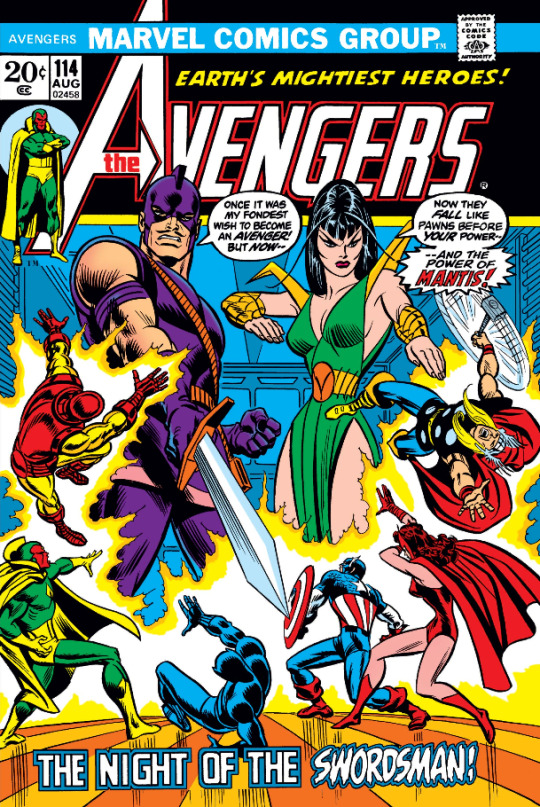
August, 1973
When Swordsman and his new ally Mantis get hold of a cache of Pym particles, they shrink the Avengers down to finally enact vengeance upon the team-
Wait. I think this is one of those covers that isn’t actually literal. Whoops.
Well just allow me one joke. THIS IS MANTIS’ BIG DAY!
So we start the comic with Scarlet Witch brooding. Because this is an Avengers comic and someone has to brood. But also because a bunch of jerks that strapped bombs to themselves and took off their pants almost killed the Vision. So she’s in a bad place, emotionally.
Not helped by someone making symbolic shadow puppets right outside her window.

In her moody wanderings, she also contemplates passing privilege and how since she could pass as human she never fully saw herself as different from humanity.
Unlike Pietro with his prematurely white hair and handlebar cowlicks.
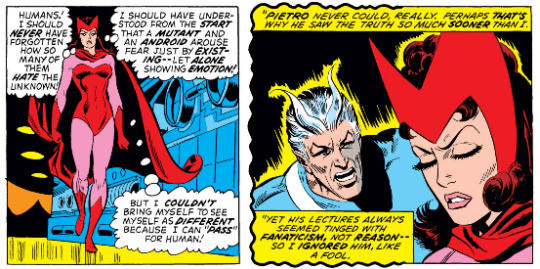
Meanwhile, Captain America and Iron Man try to beat up Vision in mock combat in the Not-Danger Room to see how he’s recovered from his injuries.
To summarize:

He is fit.
Captain America agrees. Good thing Vision is an android! If a human had someone explode in their face, they’d still be bedridden, probably.
This sets off Scarlet Witch who was watching the little mock fight. Even their friends keep reminding them that they’re not the same.
She decides to go for a walk. If she hoped to calm down she’s out of luck because she instantly runs into the worst cat-caller.
Lets call him Harry Terribleguy. Harry Terribleguy stands in her way, snidely comments on her getting her jollies from kissing a plastic man (but not Plastic Man), tells her he finds her sexually attractive, and then says that its a shame that Vision didn’t die because then she’d be on the open market.
So Wanda blasts him through a hot dog cart and calls him a stinking human pig.
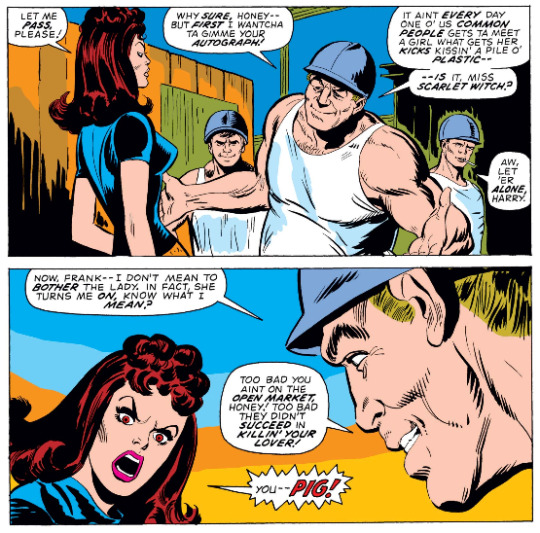
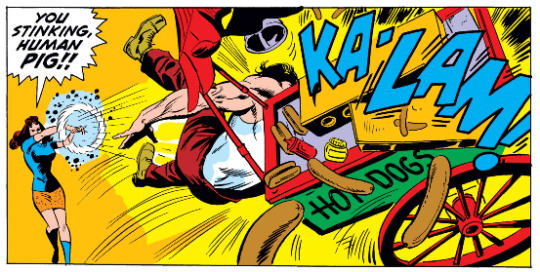
Which, y’know. They say violence doesn’t solve everything but violence is about to solve this particular situation.
Harry Terribleguy springs right back up from getting blasted through the air with the greatest of ease. He is downright peeved that she called him human like its a dirty word. Can you believe the nerve? So he decides to teach her a slap lesson with slaps.
[Then suddenly, from behind--] a new challenger.

Mantis joins the fray.
Already we see that Mantis is mighty impressive. With one glancing hit to the shoulder, she knocks Harry away from Wanda even though she was clearly punching him toward her. Her punches don’t just break bones, they make a mockery of physics.
Wanda tries to stop Mantis, saying random Harry is too strong. And Harry says that standing up to him is suicide.
And then Mantis punches him in the face... one, two, three... a lot. A lot times.

Mantis is apparently a master of preying mantis style kung fu. I assume. I don’t know enough to know whether the artist knows enough to portray it correctly. Also, Mantis is not a codename. Its her only name. I wonder if she was called Mantis before she mastered preying mantis style or what.
Also, she has antenna. She must have been hiding them in her six previous panels in the last two issues.
Did she learn preying mantis style because she figured ‘well I got the antenna already’? Or does mastering preying mantis style kung fu cause you to grow antenna?
Truly, Mantis is a mysterious character.
Anyway, Harry Terribleguy is gonna want some aspirin and probably ice to put on his face when he wakes up because he is WHOMP!’d. Mantis offers to escort Wanda home.
When they arrive at Avengers Mansion, the Avengers have all been worried about Wanda. She went somewhere without even leaving a note! They were about to go looking for her.
Geez, the Avengers are so clingy.
Anyway, Wanda insists that she can take care of herself (despite these comics going out of their way to spitefully disprove that whenever they can) and besides she made a new friend.
She invites Mantis inside but Cap objects. Unauthorized people in the clubhouse headquarters? THATS AGAINST THE RULES.
Wanda thinks Cap is being ridiculous. What harm could Mantis possibly do to the Avengers Assembled?
Swordsman pipes in to agree with Cap. If, for example, he were planning a sneak attack, their shitty, shitty security would have been no problem for him.
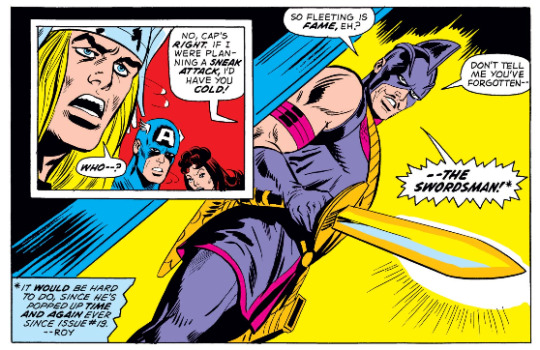
But he claims he’s not here to fight. Despite how reluctantly they accepted his help against Ares in issue #100, when he heard that Hawkeye had ragequit the team, he decided it was time for him to rejoin.
Cap is not quite thrilled. Swordsman is the worst security risk he has ever met. And in case anyone forgot, he runs through a little history of the Swordsman. The first time he conned his way onto the team, he was working to undermine them for the Mandarin.
And even if he claimed Mandarin had duped him into treachery, he then attacked the Avengers several more times for good measure. Remember how he joined Natasha’s Angels?
But Swordsman gives his side of the story. Yeah, no. Everything Cap has said is true. Swordsman has been a shitty person. And guess what he has learned from that? It is a lonely, nasty life. You make zero friends. He is persona non grata across most of the world.
Eventually he stopped caring and let himself sink into the depths of degradation. It was only meeting Mantis that helped him turn his life around. It was her interest in him that made him want to be a better person. It was her that convinced him to rejoin the Avengers and live the right life for once.

Cap doesn’t buy it.
Wanda on the other hand is the only other Avenger on the team from that time. And in her opinion, there’s been too much prejudice involved with them lately.
And the Avengers side with Wanda. Iron Man points out that Wanda and Hawkeye all had criminal records before joining. And they both proved themselves.
Thor argues that at the least, they can offer Swordsman a period of probation. With Thor taking the responsibility of keeping close watch on him.
And Black Panther just says that the name of the team is “Avengers” not “Revengers.” Which sure is an argument.
Cap loves democracy so he bows to the will of the majority. But he’ll also keep a close eye on Swordsman. Distrust but verify, y’know?
With that settled, Iron Man asks if Mantis is also asking to join.
Being an Avenger doesn’t really mean anything to her. She only wants to stay at Swordsman’s side. But screw it, I’m considering her an Avenger anyway. Try and stop me.
Wanda tells Mantis that of course she can stay in the Mansion and come on missions and spend girl time with her! Wanda really, really wants a girl friend to hang out with. Avengers Mansion is such a boys club.
In gratitude Mantis gives Wanda a big ol’ hug and gives the Guyvengers big ol’ kisses. I’ll talk a little about that later.
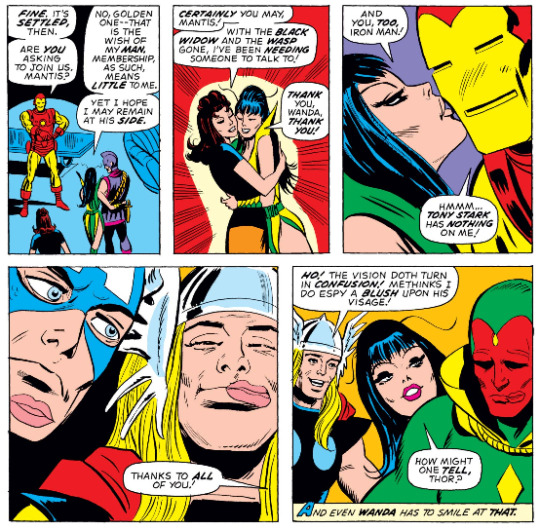
So, we get some compressed time. Several days and several missions go by with Swordsman on the team in his probationary status. Hmm. I’m reminded that his first time on the team was time skipped through as well.
At least this time we get to see some of it.
They fight sea monsters and robots and presumably other things and all throughout Swordsman acquits himself well. At no point does Thor detect any sign of treachery. Just bravery and skills.
So at the end of the vague number of probation days, Thor recommends Swordsman for full membership into the Avengers. The guy is really good with a sword, you guys. He even rivals any e’er seen in Asgard.
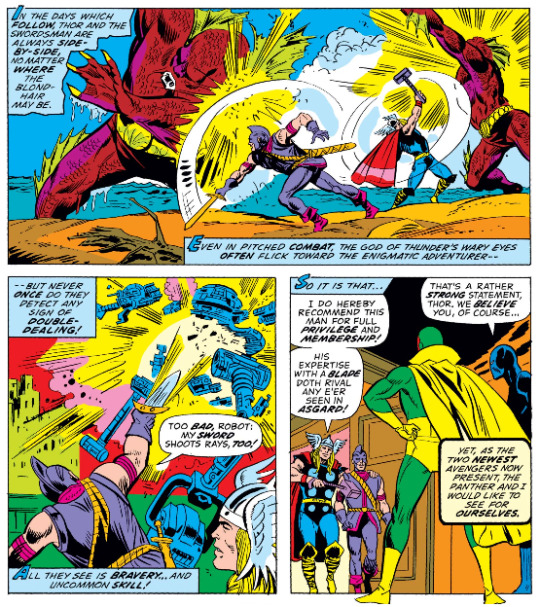
And its not that Vision and Black Panther don’t believe Thor. They just kinda want to see it for themselves. So how about a little friendly suspicious sparring match in the gymnasium?
So Swordsman and Vision shit talk each other a bit. Swordsman is the best blade artist in the world, Vision rarely offers a good target and also shoots solar beams from his forehead, I’ll see your solar beam and match you a sword beam that Mandarin put in my sword.
Black Panther jumps in. Did you mean that Mandarin who is a supervillain maybe?
Swordsman is a bit offended that Black Panther still thinks he’s trying to infiltrate and destroy the team. Black Panther offers a good point that in the middle of mock combat, he could “accidentally” kill of the Avengers with nobody the wiser so no way in hell is Black Panther going to give him the chance.
Plus, mock or no, the point of battle is to win so that’s what Black Panther is going to do.
And then he runs headfirst into Swordsman’s pommel with a TUNK!
Swordsman stands over the prone Black Panther with his sword pointed at Black Panther’s throat.

“You underestimated me, Panther! A lot of dead men made that same mistake, as their final act in life--”
But that’s not him anymore. All-New All-Different Superior Swordsman doesn’t kill anyone anymore. Especially not his teammates.
And apparently this puts to rest most of the suspicion the team has about Swordsman.
Another unknown amount of time passes until one day, Hawkeye is on the evening news. Because, remember, the Avengers get most of their information from television news.
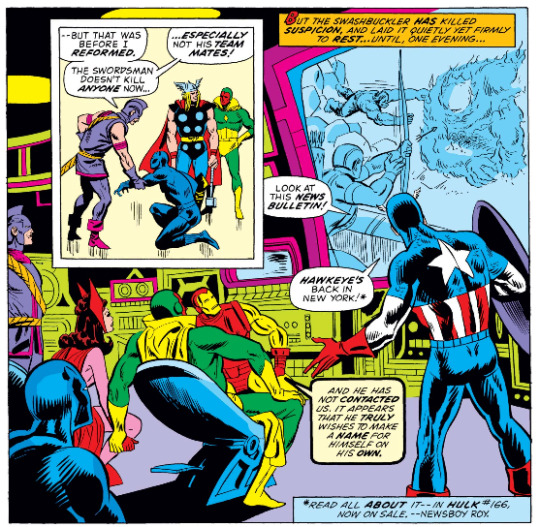
Hawkeye is back in New York, making a name for himself as a solo act in Hulk #166. Swordsman dismisses Hawkeye as a grandstander. Swordsman taught him everything he knows so with him on the team, the Avengers don’t need Hawkeye.
And then he walks out of the fancy television news room with inadequate chairs.
Cap wonders if he should follow him... but decides that would just be neurotic.
Upstairs, Swordsman meets with Mantis. It is time, the hour has arrived. See, studying martial arts gives you limited knowledge of mysticism, obviously.

Which Mantis uses to summon...

THE LION GOD!
I told you he’d be back.
THE LION GOD promises the two traitors will feel the warm glow of his gratitude for preparing a path to victory and then he OH YEAHS through a WALL to attack Black Panther.
The Lion God is very big now. Also just as mean. He mocks the Avengers for believing in wolves wearing lambskins and also for thinking they could destroy a god.
Thor throws Mjolnir at the big Lion God but in the split-second he’s distracted catching it, Mantis punches Thor in a pressure point in the neck, knocking him out.
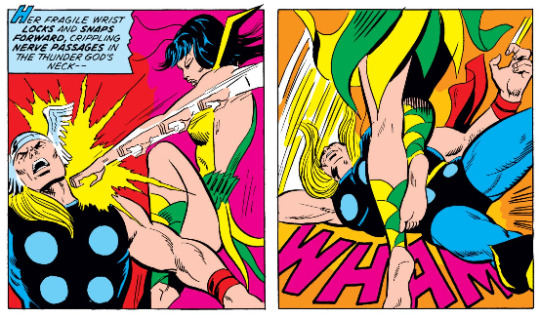
Meanwhile, Swordsman blasts Vision with an electronic ray that hits him even intangible.
And Mantis puts a death-grip on Captain America to knock him out. So not quite a death grip.
And Lion God finally joins his own murder party and blasts Iron Man with his backup divine weapon, the Lion God Hunting Spear, sold separately.
And then with the rest of the Avengers knocked out, the Lion God just scoops up Black Panther in his big hand.
How tall are the roofs in this place anyway?
Except this time, Lion God doesn’t want Black Panther’s tribal secrets. I think he’s still a little pissed over last time. Instead, he’s going to burn Black Panther at the stake as a sacrifice to the Lion God glory.
Its always human sacrifice with this dude.
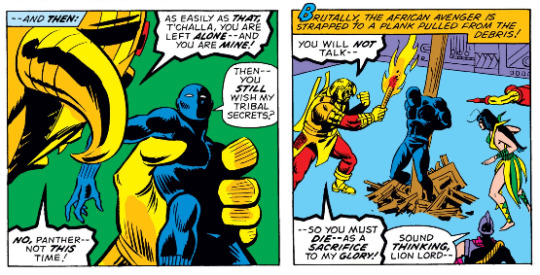
Swordsman thinks this sounds A-Okay.
But do you know what goes great with human sacrifice?
Live performances!
Swordsman performs a sword salute traditionally performed to pay homage to a liege. It looks like he’s just spinning the sword around by part of the crossguard but what do I know?
This is evidently a very sparkly salute. The sword catches the light and creates a compelling pattern of spinning flashes.
Not to be left out, Mantis dances a special sensuous dance just for the occasion! It just so happens that she’s dancing in the middle of Swordsman’s sword strobe show.
The Lion God is completely hypnotized by this. I dunnae. Maybe this performance should have come with an epilepsy warning.
My description does not do this justice. Check it out:
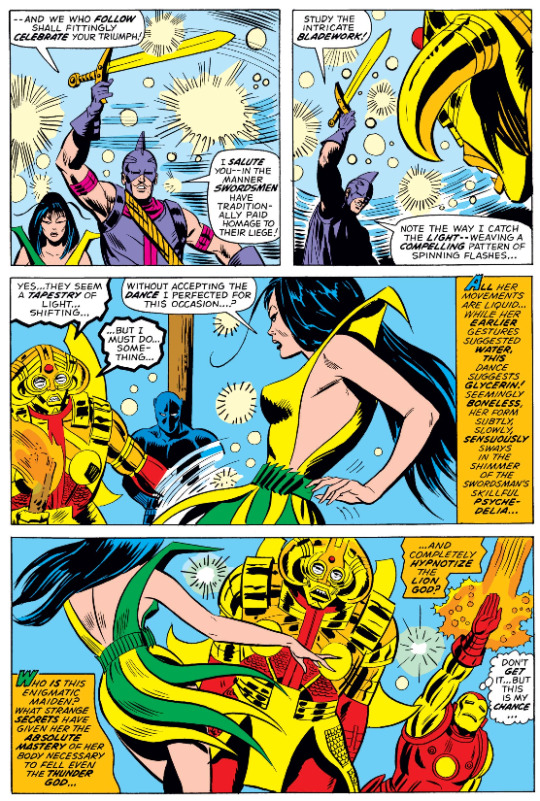
But so taken in by the psychedelic sparkle dance that the Lion God doesn’t notice Iron Man coming to. The armored Avenger blasts a button that drops an impenetrable adamantium cylinder right over the Lion God.
Since the Lion God was in his mortal form (begging the question of who he body jacked this time), he should be well and trapped. And Thor can just blast the Lion God into another dimension and keep him off T’Challa’s back for good.
Because that’s what Thor learned from his dad. Just dump your problems into other dimensions where they’ll be someone else’s problem.
Sure was lucky though that the Lion God was standing on the one spot where an inescapable cylinder would drop.

So about that...
IT WAS MANTIS’ PLAN. Her study of martial arts give her empathy with the natural world. After she and Swordsman arrived, she sensed a malignant force hovering over the Mansion.
So she came up with a plan to lure it into a trap by pretending to side with the Lion God. Then they’d use their distraction moves to steal his will to destroy and trap him.
So why didn’t they just tell the Avengers? Well. I mean. They were already suspicious of the Swordsman. What do you think they’d say if he told them he wanted to let the Lion God into Avengers Mansion and pretend to help him destroy the Avengers?
How do you think that would have gone over?
Thor thinks this is rad. Swordsman "played a dangerous game with great daring!” Thor does strike me as a guy with appreciation for doing things in the most awesome way.
Cap still finds himself suspicious. Faking being traitors to help capture the Lion God would be the perfect smokescreen to get away with worse treachery later down the line.
Cap is possibly paranoid. Possibly justly so. Who knooooows!
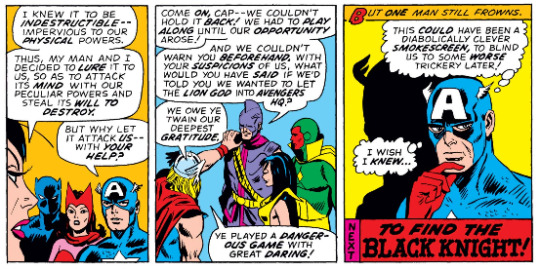
So! Mantis’ real first appearance for more than three mysterious panels!
Obviously, there are problems. Mantis being an Asian woman (specifically Vietnamese-German) with the power of martial arts. Also vague mysticism. Kind of leaning on stereotypes there.
I said I’d talk about the kissing and here I go. Its not a problem as presented where its just kind of charming. Its a problem as originally envisioned. According to Steve Englehart, "Basically Mantis was supposed to be a hooker who would join the Avengers and cause dissension amongst all the male members by coming onto each of them in turn."
That plan, thankfully, was largely abandoned.
More of a neutral than a problem but this is a densely packed issue. This is the kind of story that modern comics would stretch out to a multi-parter. Chris Claremont would probably unfurl a plot like this over a year of stories.
But despite all that, I love this issue.
There is so much good here! Using a similar-ish plot structure to sow suspicion about the Swordsman’s motives, making it plausible that he really did join the team to betray them to the Lion God. If you discount the mysterious panel appearances leading up to this issue.
That the Avengers still believe in second-chances even with everything that’s been happening in their lives.
Also, Mantis!
Mantis gets a strong introduction, at least in the sense that she gets to show off what she can do quite a bit. At this point she’s a bit of a satellite character to Swordsman, although the narration hints at mysterious dimensions to her.
Also, Mantis instantly becoming Wanda’s best friend because a best friend will break someone’s septum for you. Alas, this will inevitably devolve into love triangles and cattiness but dangit, it could have been one of the great superhero friendships.
(Imagine a Scarlet Witch/Mantis team-up book, for example. ‘She’s magic, she punches people in the throat. Together, they fight crime.’)
And lets never forget that Swordsman and Mantis defeat a god with some flashing lights and a distracting dance.
It was pretty glorious.
So now Guardians of the Galaxy Vol. 2 is out and I’m going to go see it. Because I’ve long hoped that my inexplicable fave Avenguardian would someday be in the MCU. She probably won’t save the day with a distraction dance but I hope she gets a cool, charming portrayal. Because that’s how she’ll be in the comics from then on.
Hey, if you like this cool Avengers liveblog, consider following @essential-avengers. One day, the liveblog will live there.
#Avengers#Mantis#Swordsman#the Lion God#these tags are spoilers#Thor thinks Swordsman is cooler than Fandral#disco party maneuver is sadly underused in Avengers tactics#Essential Avengers#Essential marvel liveblogging#when she joins the Silver Surfer book Mantis decides to backpack around space#and that's magical
13 notes
·
View notes
Text
The Hate U Give - A Study in Tupac Shakur - Book Analysis
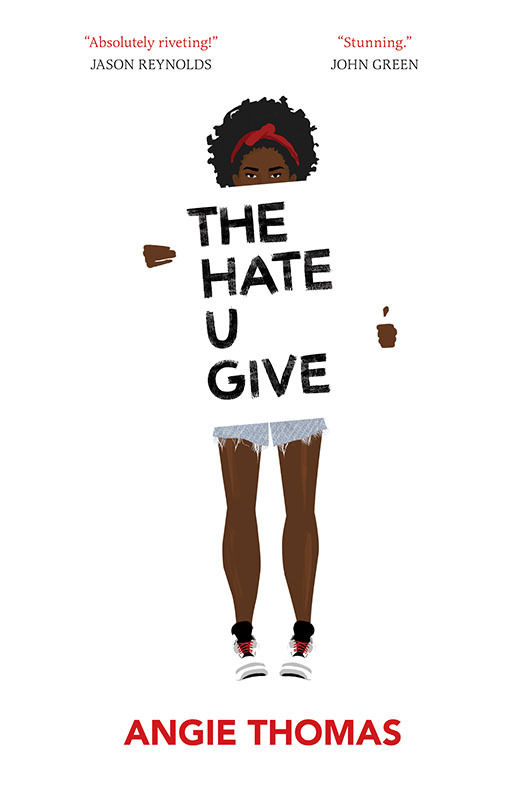
I wrote this analysis/review as spoiler free as possible but it does contain excerpts from the novel and discusses the book at length. Reading this review will inevitably spoil minor details but purposely tries to avoid any big reveals.
I just finished The Hate U Give, which isn’t my usual fair, young adult. After reading reviews the premise caught me: a young black woman is with her friend when he’s tragically fatally shot by a trigger happy police officer. From there, it follows Starr Carter’s life between the family dynamics of her father, mother, older half brother, Seven, and younger brother, Sekani.
The novel is set in unnamed city other than Starr’s neighborhood of Garden Heights, set in present day. Other than the “every town” setting, it’s meant to exist in our world, where 2pac existed and current rappers Drake, J.Cole, Kendrick Lamar and various other celebrities reside. That said, real events are mostly non-addressed except in closing and I’d argue for the better.
Only in the closing passages does Starr mention real police shootings, letting the reader explore the parallels without drawing any connection one particular event.
“It would be easy to quit if it was just about me, Khalil, that night, and that cop. It’s about way more than that though. It’s about Seven. Sekani. Kenya. DeVante.
It’s also about Oscar.
Aiyana.
Trayvon.
Rekia.
Michael.
Eric.
Tamir.
John.
Ezell.
Sandra.
Freddie.
Alton.
Philando.
It’s even about that little boy in 1955 who nobody recognized at first—Emmett.”
I didn’t know going into this this book was that it draws heavily off Tupac Shakur, to the point of what I’d dub “Tupacian”. Tupac casts a large shadow over the entire book. Despite how obvious it seems to me, I haven’t read any reviews connecting this story directly to Tupac so here’s my argument as to how deeply connected the book is to Tupac Shakur.
I’ll fully admit some of the points I’ll make are likely happenstance and/or simply reflective of the realities of racism in America. The phrase “the black experience” exists for a pretty clear reason, the white majority of Americans do not experience America the same as African Americans. Simply by writing a book that deals with racism will overlap with thematic issues covered by Tupac and by an even greater extent, hip hop at large.
That said, whether by conscience choice or simply happenstance, They Hate you Give is a hip hop novel where Tupac Shakur’s work is at the core of the tale, and is deeply entrenched with hip hop references and Tupacian thematic archetypes.
While the archetypes aren’t inherently limited to Tupac or even hip hop, but when stacked together, I believe that The Hate U Give affirms a deep study of Tupac and is much a homage to the better aspects of Tupac.
I’m also convinced that The Hate U Give also will be a better 2pac movie than the biopic after seeing the trailers for All Eyez On Me but that’s another rant aside.
Tupac used as narrative device:
At several key points of the book, 2pac’s works are used to both foreshadow and create exposition:
“Mind your business, Starr! Don’t worry ’bout me. I’m doing what I gotta do.”
“Bullshit. You know my dad would help you out.”
He wipes his nose before his lie. “I don’t need help from nobody, okay? And that li’l minimum-wage job your pops gave me didn’t make nothing happen. I got tired of choosing between lights and food.”
“I thought your grandma was working.”
“She was. When she got sick, them clowns at the hospital claimed they’d work with her. Two months later, she wasn’t pulling her load on the job, ’cause when you’re going through chemo, you can’t pull big-ass garbage bins around. They fired her.” He shakes his head. “Funny, huh? The hospital fired her ’cause she was sick.”
It’s silent in the Impala except for Tupac asking who do you believe in? I don’t know.
My phone vibrates again, probably either Chris asking for forgiveness or Kenya asking for backup against Denasia”
Tupac’s song “Who Do You Believe in?” is a paranoid exploration about psychological toll of urban decay and death.
So I'm askin', before I lay me down to sleep
Before you judge me
Look at all the shit you did to me; my misery
- 2pac, Who Do You Believe in
At the beginning of chapter ten, Starr decides to join her dad on errands for his story. During the trip, 2pac’s song, “Keep Your Head Up” is used as exposition again and mild foreshadowing as Starr struggles with her friend’s death.
“I’m always down to hang out with him.
We roll through the streets, Tupac blasting through the subwoofers. He’s rapping about keeping your head up, and Daddy glances at me as he raps along, like he’s telling me the same thing Tupac is.
“I know you’re fed up, baby”—he nudges my chin—“but keep your head up.”
He sings with the chorus about how things will get easier, and I don’t know if I wanna cry ’cause that’s really speaking to me right now, or crack up ’cause Daddy’s singing is so horrible.
Daddy says, “That was a deep dude right there. Real deep. They don’t make rappers like that no more.”
“You’re showing your age, Daddy.”
“Whatever. It’s the truth. Rappers nowadays only care ’bout money, hoes, and clothes.”
“Showing your age,” I whisper.
“’Pac rapped ’bout that stuff too, yeah, but he also cared ’bout uplifting black people,” says Daddy. “Like he took the word ‘nigga’ and gave it a whole new meaning—Never Ignorant Getting Goals Accomplished. And he said Thug Life meant—”
“The Hate U Give Little Infants F---s Everybody,” I censor myself. This is my daddy I’m talking to, you know?
“You know ’bout that?”
“Yeah. Khalil told me what he thought it means. We were listening to Tupac right before . . . you know.”
“A’ight, so what do you think it means?”
“You don’t know?” I ask.
“I know. I wanna hear what you think.”
Here he goes. Picking my brain. “Khalil said it’s about what society feeds us as youth and how it comes back and bites them later,” I say. “I think it’s about more than youth though. I think it’s about us, period.”
“Us who?” he asks.
“Black people, minorities, poor people. Everybody at the bottom in society.”
“The oppressed,” says Daddy.
“Yeah. We’re the ones who get the short end of the stick, but we’re the ones they fear the most. That’s why the government targeted the Black Panthers, right? Because they were scared of the Panthers?”
“Uh-huh,” Daddy says. “The Panthers educated and empowered the people. That tactic of empowering the oppressed goes even further back than the Panthers though. Name one.”
Is he serious? He always makes me think. This one takes me a second. “The slave rebellion of 1831,” I say. “Nat Turner empowered and educated other slaves, and it led to one of the biggest slave revolts in history.”
Again, we have the content of Tupac’s song reflected in the story. Below is the hook, literally as her dad is comforting his daughter by trying to normalize her life after the shooting. In his own way, he’s also placing the pivotal title, THUG on the book.
Keep ya head up, ooh, child
Things are gonna get easier
Keep ya head up, ooh, child
Things'll get brighter
Keep ya head up, ooh, child
Things are gonna get easier
Keep ya head up, ooh, child
Things'll get brighter
- 2pac, Keep Your Head Up
When Seven is driving with Chris, Kenya, DeVante, and Starr, after the pivotal moment where DeVante is rescued from an already dangerous situation, Seven realizes his mother helped Chris, Kenya and Starr rescue DeVante. Seven wants to go back to try and get her out of the situation, but Starr sees the futile logic, and tries to reason with Seven not to go back.
2pac’s Changes plays when Seven ultimately is convinced to u-turn and not to go back to King’s house and the choice inevitably leads the group to the protests at the end of chapter 24.
“A Tupac song on the radio makes up for our silence. He raps about how we gotta start making changes. Khalil was right. ’Pac’s still relevant.
“All right,” Seven says, and he makes another U-turn. “All right.”
2pac’s Changes is to-date, 2pac’s highest chart topping song, originally released as a B-Side on Brenda’s Got A Baby but re-release on his greatest hits, remixed and remastered to its catchier version that most listeners know today. Changes centrally covers police brutality, racism, the rise of black incarceration, drug dealing, and gang violence, ultimately with 2pac asking listeners to make changes, while over an interpolation of "The Way It Is" by Bruce Hornsby and the Range. The entire song feels as urgent a quarter century later as it did in 1992 and could be quoted in its entirety.
youtube
I see no changes. All I see is racist faces.
Misplaced hate makes disgrace to races we under.
I wonder what it takes to make this one better place...
let's erase the wasted.
Take the evil out the people, they'll be acting right.
'Cause both black and white are smokin' crack tonight.
And only time we chill is when we kill each other.
It takes skill to be real, time to heal each other.
And although it seems heaven sent,
we ain't ready to see a black President, uhh.
It ain't a secret don't conceal the fact...
the penitentiary's packed, and it's filled with blacks.
But some things will never change.
Try to show another way, but they stayin' in the dope game.
Now tell me what's a mother to do?
Bein' real don't appeal to the brother in you.
You gotta operate the easy way.
"I made a G today" But you made it in a sleazy way.
Sellin' crack to the kids. "I gotta get paid,"
Well hey, well that's the way it is.
2pac - Changes
I could spent paragraphs unpackingChanges, but its best simply listened to after reading the book.
Lastly, when Starr finally moves into up into her new room, Tupac is used to reflect on Khalil in the closing of the book.
“Momma leaves with the phone, and I turn onto my side. Tupac stares back at me from a poster, a smirk on his face. The Thug Life tattoo on his stomach looks bolder than the rest of the photo. It was the first thing I put in my new room. Kinda like bringing Khalil with me.
He said Thug Life stood for “The Hate U Give Little Infants Fucks Everybody.” We did all that stuff last night because we were pissed, and it fucked all of us. Now we have to somehow un-fuck everybody.”
References to 2pac
1) I’ll start with the most obvious. The Hate U Give, is “THUG”, such a direct reference to 2pac that not one but two characters explain the meaning of 2pac’s love of acrynomistic interpretations of words. Tupac was hardly the first rapper to lift acronyms, as the 5 Percent Nation slang infected hip hop in the late 80s and early 90s. For examples, see any rhyme that involves the phrase Arm Leg Leg Arm Head (Allah) orPete Rock and CL Smooth’s “They Reminisce Over You, T.R.O.Y.”
Tupac once explained Thug Life as “The Hate U Give Little Infants Fucks Everybody”, an exposition of the black experience according to Shakur. Tupac doesn’t single out just whites or blacks or any other single sect of society but rather points out the normalization of racism hurts white people as well as black people and any other ethnic group. It’s a very progressive argument to be made by man in his early 20s back in the early 90s (lest not forget 2pac was another young black man gunned down at 25).
“Khalil drops the brush in the door and cranks up his stereo, blasting an old rap song Daddy has played a million times. I frown. “Why you always listening to that old stuff?”
“Man, get outta here! Tupac was the truth.”
“Yeah, twenty years ago.”
“Nah, even now. Like, check this.” He points at me, which means he’s about to go into one of his Khalil philosophical moments. “’Pac said Thug Life stood for ‘The Hate U Give Little Infants Fucks Everybody.’”
I raise my eyebrows. “What?”
“Listen! The Hate U—the letter U—Give Little Infants Fucks Everybody. T-H-U-G L-I-F-E. Meaning what society give us as youth, it bites them in the ass when we wild out. Get it?”
“Damn. Yeah.”
“See? Told you he was relevant.” He nods to the beat and raps along. But now I’m wondering what he’s doing to “fuck everybody.” As much as I think I know, I hope I’m wrong. I need to hear it from him.”
2) The second most obvious 2pac reference is both Starr Amaru Carter shares the same middle name of Tupac Amaru Shakur. Also notable is the Starr’s last name is the same as Jay-Z, which also is referenced when Starr jokes about the wishful possibility of being an estranged relative relationship to Jay-Z. The spelling of Starr could be also taken as homage to Black Star (Mos Def + Talib Kweli) or Gang Starr (Guru + DJ Premier).
Bonus:
Both groups pay homage to fallen rappers, such as on Black Star’s most famous track “Definition” which features the chorus of:
“One, two, three,
It's kind of dangerous to be an MC,
They shot 2Pac and Biggie,
Too much violence in hip-hop, Y-O”
- BlackStar, Definitiona
In the case of Gang Starr, DJ Premier especially being responsible for exposing a wider audience to Big L, or songs like on their classic album Moment of Truth on the song “In Memory Of...” which calls out a large cast of fallen hip hop pioneers including ‘Pac and Biggie.
Also notable, Mos Def performed Panther Pride as spoken word by 2pac on the tribute album, The Rose That Grew From the Concrete, further deepening the Tupac connection to Black Star.
These are loose tangential connections to Tupac. Even Sean Carter (Jay-Z) was called out as the ring leader of East Coast rappers looking to tarnish 2pac’s namesake on Tupac’s Makalevi album, The Seven Day Theory.
In a more literary sense, Starr literally is the star of the book, akin to over-the-top literary naming conventions like Hiro Protagonist in Neil Stephenson’s classic, “Snow Crash”.
3) King is a Suge Knight-esq character even described as a physically imposing 300 pound bearded bald man, standing just above 6 feet and always carrying a cigar. Knight’s kingpin image as a villain has become the standard bearer of the evil gang affiliated record exec and the archetype of the hip hop villain, (see Def Jam’s Vendetta/Fight For NY character, D-Mob, or Lucious from Empire) .
King isn’t a studio exec nor does he manage musicians in the The Hate U Give, but his demeanor is a distilled version of Knight.
Bonus:
A laundry list misdeeds have been attributed to Knight and his cronies. Many fans of 2pac believe that Suge Knight orchestrated the hit on 2pac in Las Vegas. Lead Investigator of the Christopher Wallace murder, Russel Poole, believes that Suge Knight was behind the murder of the Notorious Big.
4) Colors play a part in the gang culture, grey and green are substituted for the real life crips and blood affiliations, a throwback to colors and gang life of the early 90s. Tupac often referenced M.O.B., Money Over Bitches but for those who knew Suge, M.O.B. was a menacing endorsement of the Mob Piru Bloods. The divisions of even the same gangs by regionality like the divisions of Bloods are reflected as King Lords has divisions within the same gang, akin to the world that Tupac lived in. Notably the reality of gang life isn’t unique to only 2pac but the the dedication to gang colors was originally a west coast phenomenon but spread.
NYC underground legend, OC (of the D.I.T.C.)’s Memory Lane illustrates the division of New York vs Los Angeles in the 80s.
I recall one of my cousins goin out to California
Comin’ back tellin us niggas dyin over colors
He told me 'bout, khaki wearin, jheri curl brothers
Doin’ drivebys in cars with machine guns bustin’
I found it farfetched, thinkin his story is stretched
Findin’ out later on about the West coast sets
Let me fast-forward the story and tell ya how it ends
They moved to start a new life for his life to end
Come to find out later on he was Blood inducted
From the same set he claimed was the Blood who bucked him
- OC, Memory Lane*
The link has the track label mislabeled.
5) Seven’s name toys with the numerological side of hip hop.
I rarely-to-never put credence into numerology or anagrams as both are logical fallacies as it flirts with enthymemes and is an exercise in confirmation bias.
Most of the post-humorous “2pac is alive” theories had to do with seriously large jumps like “Makaveli = Mak alive”. I could easily connect the number to 2pac.
Example: Seven isn’t exactly limited to any one sect of western society due to its prevalence as a “lucky” number but 2pac’s Makaveli - The Don Killuminati: The 7 Day Theory, has seven in the title. Seven also happens (more coincidence than anything) to be the number of official 2pac’s post humorous albums.
While many theories circulate around the meaning of the Makaveli album’s title, quite literally the album was recorded a single week, hence the “Seven Day Theory.” In the context of a Tupanian world and as someone familiar with the importance of numerology among 2pac fans, I’d argue that simply using a number (any low digit number) would allow fans to make tangential claims about said number. This logical fallacy is known as “Attempts by gamblers to see patterns in random chance”, where coincidence is chalked up to some convoluted pattern, that often requires significant hurdles to arrive at.
While I’d wager that Seven’s name isn’t a direct reference to 2pac, I can see Angie Thomas toying with the reader, looking to make numerological connections to any (bad pun) number of things as numerology factored quite a bit into post-humorous Tupac conspiracies.
6) Big Mav, aka Maverick, Starr’s father, is constantly tending roses in his garden (and talking to them) despite being a fairly traditionally masculine character. The affinity with roses is shared with 2pac. 2pac’s autobiographical poem is “The Rose That Grew From the Concrete” which also is the name of his collected publication of his poetry. “Mama's Just A Little Girl” and” I Ain't Mad at Cha” both feature the iconography of roses pertaining as a metaphor for raising children in the urban ghettos. Big Mav struggle to raise roses in his urban environment is an allegory for his own careful attention to Starr (and all his children). Roses to my knowledge, are the only flower ever mentioned by variety in any 2pac song.
7) Khalil is potentially named after the actor that played in Juice, one of Tupac’s best friends, Raheem. Raheem is shot dead by Tupac’s character. While there isn’t a greater metaphor here, Tupac’s portrayal of Bishop, the antagonist in the film is widely regarded as Tupac’s defining film role, and a center of Tupacian lore as its his first film role. As the story goes, he landed it on an impromptu reading while hanging out with Treach of Naughty By Nature.
Also, police violence towards young black men is central to the Tupacian universe. This shouldn’t come as any surprise as Tupac confronted the reality of growing up as black male from a very early age.
Cops give a damn about a negro
Pull the trigger, kill a nigga, he's a hero
Mo' nigga, mo' nigga, mo' niggas
Rather I'd be dead than a po' nigga
Let the Lord judge the criminals
If I die, I wonder if Heaven got a ghetto
- 2pac, I Wonder if Head Got a Ghetto
8) ) Golden Era references are aplomb in this book. For those unfamiliar, the Golden Era is usually cited as roughly between 1987-1995, marking the rapid rise of hip hop in public conscience era and of the most rapid evolution of hip hop in both lyricism, and production. While the exact years are often debated, the golden era is never extended beyond the deaths of 2pac and Biggie in 1996. The throwback references are largely to cultural references that existed when 2pac was alive. The obsession with Jordans is a 90s sneaker head theme. Shoe fetishism has been deeply entrenched with hip hop, especially in the indie rap scene as of today. This could easily be a book worth, but Jordan represents the shift from Adidas to Nike, which happened during the Golden Era.. While Tupac wasn’t explicitly a sneaker head, fans and publications have noted Tupac wearing Jordans.
More indicative of the throwback references, are with Starr and Chris’s obsession of Fresh Prince of Bel-Air, Jordans, and references to NWA and the movie Friday. Notably, Fresh Prince of Bel-Air is set in the in LA, NWA is from LA, and Friday is a movie set in LA. 2pac is most closely associated with Los Angeles despite being from NYC and also residing in Oakland.
DeVante is named after DeVante Swing, directly referenced to 90s RnB group, Jodaci, DeVante Swing even produced a song for Tupac, although not really affiliated. For a bit of unrelated trivia, Jodaci is where Sean “Puffy” Combs got his start in the music business as his first major act to break. Puff Daddy (as he was known) is a central figure in 2pac’s beef with the Biggie.
Lastly, even the phrase” Westside is the best side” uttered in the book, and is a throwback reference to the West vs East hip hop beef, prominently between Tupac and Biggie and whoever else Tupac threw under the bus in diss records (Nas, Jay-Z, Mobb Deep and even The Fugees).
9) Starr’s childhood friend, Natasha, died of gang violence. Tupac often recorded odes to fallen friends, most notably Kato who died of gang violence who’s referenced in lyrics on “How Long With they Mourn Me”, “So Many Tears”, “Ready For Whatever, “Only Fear of Death”, “Where do we go from here”, “Ballad of a Dead Soulja”, “Life Goes On” and “White Man’z World”. While the repercussions of gang violence is hardly new territory for hip hop, it follows the Tupacian thematic tone. This may be grasping at straws Natasha’s death reads quite a bit like Tupac’s description of Latasha mentioned in “Hellrazor”.
Dear Lord if ya hear me, tell me why
Little girl like LaTasha, had to die
She never got to see the bullet, just heard the shot
Her little body couldn't take it, it shook and dropped
And when I saw it on the news how she bucked the girl, killed Latasha
Now I'm screamin fuck the world,
-2pac, Hellrazor
Notably, The real LaTasha Harlins was shot when a store manager assumed LaTasha was stealing liquor and a conflict arose where Latasha was shot, in the back of the head, attempting to leave.
10) The reactions to the police verdict result in a full blown riot resembling the the LA riots in depth and scope. This is as much about today as it is thematically 2pac. Tupac several times references rioting, (as the LA riots happened in April 29, 1992 - May 4, 1992.
First you didn't give a fuck, but you're learnin now
If you don't respect the town then we'll burn you down
God damn it's a motherfuckin riot
Black people only hate police so don't try it
If you're not from the town then don't pass through
Cause some O.G. fools might blast you
- 2pac, I Wonder if Head Got a Ghetto
I must reiterate that this alone isn’t inherently Tupacian as the LA Riots have had a long standing hold the public conscience, and any riots resulting from unfavorable outcomes circulating police brutality automatically welcome a comparison to the LA Riots.
While I’m sure there’s other relationships other readers can make connections to 2pac, these were the most easily recognized for me.
youtube
Recommended listening from 2pac:
Changes
HellRazor
Me Against The World
I Wonder if Heaven Got A Ghetto*
Trapped
Holler if You Hear Me
Brenda’s Got A Baby
Keep Your Head Up
Until the End of Time (RP Remix)
My Block
Do For Love
*I Wonder If Heaven Got A Ghetto borrows several lines from Changes (or vice versa) as Changes was originally a B-Side that was never released on an album. The remix I Wonder If Heaven Got A Ghetto I personally like
#the hate u give#2pac#tupac#tupac shakur#Hip hop music#political rap#political hip hop#book review#book analysis#black lives matter#hip hop#westside#west coast#thug life#angie thomas#ya novels#literature
2 notes
·
View notes